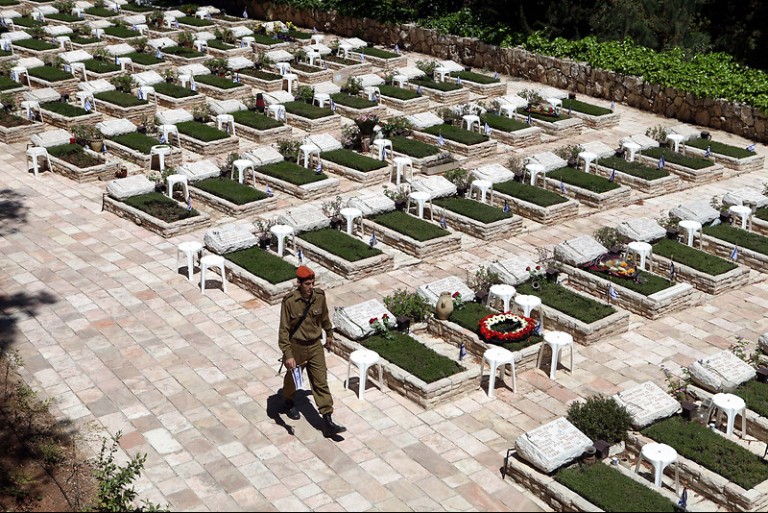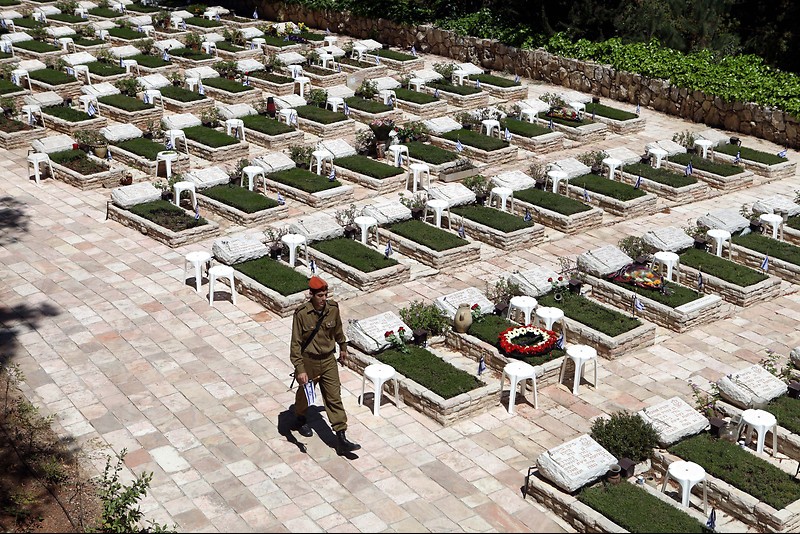 I WENT TO A FUNERAL — a spring funeral — in the city of Jerusalem. An Israeli soldier was killed; a Jewish boy had died. Another name was added to a list, a long list, of Jews who have given their lives in the past fifty years so that the Jewish State of Israel might live. I didn’t know this particular soldier, but it didn’t matter. He was one of ours – our children, our soldiers, our sons.
I WENT TO A FUNERAL — a spring funeral — in the city of Jerusalem. An Israeli soldier was killed; a Jewish boy had died. Another name was added to a list, a long list, of Jews who have given their lives in the past fifty years so that the Jewish State of Israel might live. I didn’t know this particular soldier, but it didn’t matter. He was one of ours – our children, our soldiers, our sons.
His name was Yehoshua.
He had come to Israel alone, from Montreal, and had joined Tzahal – the Israel Defense Force. Now his parents, stunned, bewildered, jet lagged, disoriented, had hurriedly come to join him one last time. The mother who brought forth a child from her womb would now return him to the womb of the earth. The father who dreamed of escorting his son to the marriage canopy, now followed him to the grave.
He was so young, their son. Old enough to be a soldier; old enough to have made Aliya; but barely finished with the business of being a boy. He thought he was returning to his ancient homeland to begin a new life. How could he know he was coming home to end his short sojourn in this world?
The funeral should have taken place a week earlier, but it took four or five days to find his body. You see, Yehoshua had been kidnapped and slaughtered by terrorists who stalk the Land of Israel, seeking Jewish blood under the guise of freedom fighters. Then a huge snow storm in Canada grounded all planes. No one knew if his parents would arrive on time.
So thousands of strangers came in their place. They did not know Yehoshua personally either, but they claimed him as their own, perhaps because he had come to them alone. Like our father Abraham, Yehoshua had left the safe and familiar to follow his God and to join his people in the Promised Land. He wore their khaki uniform and stood side by side with his brothers and sisters, willing to endanger his life and, if need be, make the ultimate sacrifice for their welfare. In ancient Egypt, Pharaoh had buried Jewish infants in the walls and monuments memorializing Egypt’s dead. Now, Jewish soldiers stood shoulder to shoulder, forming a living wall to protect Jewish children and keep them alive. Yehoshua stood with them.
He was killed because of a khaki uniform, a blue and white flag, a Star of David. Because “in every generation, they rise up against us to destroy us”. Because he was a glowing, living stone in our protective wall. Because he was a son of Abraham, a son of the covenant, a Jew in a Jewish land.
His parents spent twenty years or so raising him – through fevers and vaccinations and summer vacations and birthday parties and worries and hopes – many, many hopes. They were all laid to rest on that grey, spring afternoon in the Holy City of Jerusalem.
I was swept along in the sea of silent marchers. They edged silently forward, crunching the gravel of well-tended paths beneath their feet. The air was heavy with their silence and their sighs. All along the paths they sighed. Old people and young. Thousands and thousands of them, parents carrying babies, students holding books, soldiers toting guns.
They stopped before the freshly dug gravesite and the sweeping, communal sigh was heard again. They huddled together, each one alone, before that awful gap in the ground. The earth lay open and exposed, its surface turned back like flaps of skin on a human chest, ready for surgery. Was the gaping hole a wound in the heart of the Land? Or had the Land opened its heart to embrace yet another son and gather in his war-torn body as his soul journeyed onward? No one spoke. There were no words. Only heavy, heart-weary sighs.
The almond trees were in bloom. Frothy-white blossoms covered the mountaintop like spring brides hovering over still, sleeping grooms. Life and death mingled like old friends at a party. For some, life in all its turbulence would, meanwhile, go on. For others, time was forever stilled. The exact date was etched on stone.
Even the birds were still that day. Hundreds of trees grace Har Herzl and thousands of birds daily fill the mountainside with their music. But that day all were strangely mute. Suddenly, one lonely songbird pierced the wall of silence with a stunning serenade.
“Do not despair! This is not the end! A soul has returned to his Maker, but there is still work waiting to be done, worlds to be built, songs to be sung. The world is alive with the promise of spring. God wills that Life go on!” Yehoshua was no more, but Am Yisrael Chai – his people – are alive.
The crowd listened to the Kaddish prayer and said a hushed, muted Amen. And they sighed.
It is not easy to carry the burden of the Land of Israel. It is no simple matter to be deserving of this ancient, holy, demanding Homeland. For the Wandering Jew, even a small plot of land, just big enough to hold a coffin, comes with a steep price. Even when the land is ours.
The cemetery is peaceful, quiet, very beautiful. The mountain is terraced with waves of neatly tended, low, square stones, each one lovingly landscaped and decorated, bordered with bright flowers and green plants. Each stone is carefully lettered with a name, parents’ names, date of birth, place of birth, date of death. The letters are silent, but the stones cry – for those who died so that after two thousand years, the Jewish people might finally live – in peace – in their own Promised Land.
Those who lie here have a right to this lovely hill, this exclusive piece of real estate overlooking the Holy City of Jerusalem. They have paid for it with precious life’s blood. And we have a right to our Promised Land. But there is a price, even for a promise. When, I wonder, will the price be paid in full? My eyes wander across the seemingly endless rows of stones. They fill with tears.
It begins to rain. Even in heaven, the tears will flow.
Reprinted from Cinnamon and Myrrh, © 1994 by Yaffa Ganz, Feldheim Publishers.



